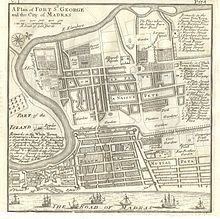| Madras Synagogue | |
|---|---|
| Hebrew: בית הכנסת במדרס | |
 The seal of the synagogue The seal of the synagogue | |
| Religion | |
| Affiliation | Orthodox Judaism |
| Rite | Nusach Sefard |
| Ecclesiastical or organizational status | Synagogue |
| Status | Active |
| Location | |
| Location | Chennai, Tamil Nadu |
| Architecture | |
| Type | Synagogue architecture |
| Date established | c. 1600s (as a congregation) |
| Completed | 1644 |
The Madras Synagogue (Hebrew: בית הכנסת במדרס) is an Orthodox Jewish congregation and synagogue, located in Chennai (formerly known as Madras), in the state of Tamil Nadu, India. Completed in 1644, by Jacques de Paiva, a Paradesi Jew, it is the only synagogue in Chennai. Madras Synagogue was also known as the Esnoga, or Snoge; Esnoga means synagogue in Ladino, the traditional Judaeo-Spanish language of Sephardic Jews.
The Amsterdam Sephardic community was among the richest Jewish communities in Europe during the Dutch Golden Age. They came to Chennai for trading in Golconda diamonds, precious stones and corals, they developed very good relations with the rulers of Golkonda and maintained trade connections to Europe.
Stone inscription of the oldest synagogue in Tamil Nadu has been discovered near Valantharai near Ramanathapuram. This inscription dates from the 13th century.
History
The first Madras Synagogue and cemetery was built by Amsterdam Sephardic community in Coral Merchant Street, George Town, in the 1600s. At the time there were a large presence of Portuguese Jews in the seventeenth and eighteenth centuries. Neither the synagogue nor the Jewish population remains today.

The Second Madras Synagogue and Jewish Cemetery Chennai was built in 1644 by Jacques de Paiva, also from the Amsterdam Sephardic community, in Peddanaickenpet, which later became the South end of Mint Street. In 1934, the second synagogue and the cemetery were partly demolished by the local government. The tombstones were moved to the Central Park of Madras along with the gate of the cemetery on which Beit ha-Haim were written in Hebrew.

The remaining synagogue and cemetery were fully demolished by local government authorities on 5 June 1968. The local government resumed the land for building a government school. The rabbi at that time, Rabbi Levi Salomon, the last Rabbi of the congregation died of a heart attack. The remaining tombstones were moved opposite Kasimedu cemetery. In 1983, the tombstones from Central Park and those opposite the Kasimedu cemetery were moved to Lloyds Road, when the Chennai Harbour expansion project was approved. In this whole process 17 tombstones went missing, including that of Jacques de Paiva.
Present
After ISIS planned attack, Madras Synagogue is at undisclosed location under custody of Isaac and Rosa Charitable Trust, Henriques De Castro family.
Henriques De Castro family has decided to hand over everything to Archaeological Survey of India
Objects of antiquity
Madras Synagogue has eight Scrolls of the Law, several gold, silver and brass Antique Judaica Items.
Gallery
-
 Sefer Torah in an Aron Kodesh
Sefer Torah in an Aron Kodesh
-
 Silver Yad
Silver Yad
-
 Menorah
Menorah
-
 Haggadah of Rabbi Salomon Halevi, the last rabbi of the synagogue
Haggadah of Rabbi Salomon Halevi, the last rabbi of the synagogue
-
 Books from the synagogue
Books from the synagogue
-
 Mezuzot from the synagogue
Mezuzot from the synagogue
-
 The synagogue office
The synagogue office
-
 Sefer Torah decoration jewels
Sefer Torah decoration jewels
-
 Shabbat Secretary desk
Shabbat Secretary desk
-
 Besamim box from the synagogue
Besamim box from the synagogue
-
 1873 filigree spice besamim box from the synagogue
1873 filigree spice besamim box from the synagogue
-
 Tefillin bags from the synagogue
Tefillin bags from the synagogue
See also
References
- Reich, Aaron (14 July 2022). "Stone Inscription of Oldest Synagogue in Tamil Nadu Found". The Times of India. Retrieved 11 November 2024.
- Muthiah, S. (2004). Lakshmi, C. S. (ed.). The Unhurried City: Writings on Chennai. Penguin Books India. p. 30. ISBN 9780143030263. Retrieved 6 October 2018.
- "The last family of Pardesi Jews in Madras". Madras Musings. 9 February 2018.
- Arbell, Mordechai. "The Portuguese Jewish Community Of Madras, India, In The Seventeenth Century". Sefarad.org. Retrieved 6 October 2018.
- "18th century Jewish cemetery lies in shambles, craves for attention". The New Indian Express. 31 October 2012.
- "Will Chennai's Jews be there?". The Hindu. 30 September 2002. Archived from the original on 12 March 2003.
- "18th century Jewish cemetery lies in shambles, craves for attention". 31 October 2012.
- Sampath, Janani (10 May 2016). "Chennai's link to its Jewish past, cemetery in Mylapore fading into oblivion". DT Next. Archived from the original on 10 June 2016. Retrieved 6 October 2018.
- "ISIS planned attack on Kodai Jews". 12 August 2017.
External links
- The Jews of Chennai
- A two-minute video (#1) of the synagogue interior. Wikimedia Commons. October 2020.
- A two-minute video (#2) of the synagogue interior. Wikimedia Commons. October 2020.
| Active |
| ||||||||||
|---|---|---|---|---|---|---|---|---|---|---|---|
| Former |
| ||||||||||
| Places of worship in Chennai | |
|---|---|
| Temples |
|
| Churches |
|
| Mosques | |
| Jain temples |
|
| Buddhist temples | |
| Gurudwaras | |
| Parsi temples | |
| Jewish synagogues | |
Categories: